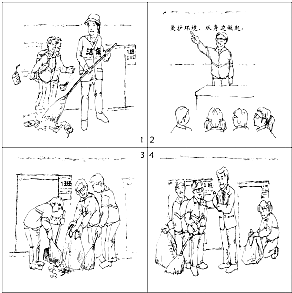题目内容
13.On my walk home one night,I saw a man lying on the floor.One or two people noticed him,but walked on by.I stopped and spoke to him.He mumbled (含糊地说)some words I couldn't make out.From his breath it was obvious he'd been drinking.I kept trying to speak to him until I got his address-a number and a road name that I recognized.It was only a ten minutes walk from here.Part of me wanted to help,but there's also fear arising.He was much bigger than me.In the end I decided to go for it.I helped him up,he held onto my shoulders and arm,and we struggled to his home.
The walk took about 40minutes instead of the 10.Throughout that walk,I felt a constant worry.Was the address he gave me a genuine one?Did he want to lead me into a trap where a gang of them might then rob me?
Halfway to his home,he stopped,took out his phone and then handed it to me.I asked him why he was doing that,and he said,"to test your loyalty."
That moment struck me.All this time I was worried about what he might do to me.And it meant I wasn't in his shoes understanding what he was feeling.He was likely feeling the same anxiety.Would this random person try to rob me?Could I trust him to lead me home?What if he hurt me?
So when he turned around and handed me his phone as a sign of trust.I felt touched and honored at this act of courage.
We walked the rest of the way to his home.When we got close,I noticed he recognized his home.Sure enough,it was the door number he told me.I felt a sense of relief.I was so glad that we made it home.More than anything else I was able to be in his position,experiencing his fear and understanding his same anxiety.That was a lesson I would carry over my life.
21.We can learn from the first two paragraphs thatD.
A.the man had nowhere to go
B.only a few passers-by stopped to help
C.the man didn't tell the author his address
D.the author had difficulty supporting him.
22.When leading the man home,the author feltC.
A.frightened
B.surprised
C.anxious
D.confused
23.The man handed his phone to the author becauseA.
A.he chose to trust the author despite worry
B.he wanted the author to call his family
C.he didn't want to keep his phone any more
D.he wanted to give it in return for the received help.
24.What message does the passage intend to convey?B
A.Kindness is in itself a reward.
B.Put yourself in others'shoes.
C.Think twice before you leap
D.Never judge a book by its cover.
分析 本文属于记叙文阅读,作者通过这篇文章向我们讲述了在他回家的一个晚上在路上遇到了一个躺在地板上的男人,作者想要去帮助他但是害怕他是骗子,作者担心自己被他抢劫,后来这个人拿出手机向作者表示他的信任,作者才意识到可能这个人也在提防着自己,作者通过这篇文章告诉我们凡事要学会换位思考.
解答 21.D 细节理解题,根据第一段I stopped and spoke to him.He mumbled (含糊地说)some words I couldn't make out.From his breath it was obvious he'd been drinking.可知这个人喝了酒,作者听不清他在讲什么,因此很难帮助他,故选D.
22.C 推理判断题,根据第三段Throughout that walk,I felt a constant worry.Was the address he gave me a genuine one?Did he want to lead me into a trap where a gang of them might then rob me?可知作者在送这个人回家的过程中他很担心,作者不知道他是否得到了正确的地址,担心这是个陷阱,因此很焦虑,故选C.
23.A 细节理解题,根据倒数第二段So when he turned around and handed me his phone as a sign of trust.I felt touched and honored at this act of courage.可知这个人讲电话交给了作者是因为他选择相信作者,故选A.
24.B 主旨大意题,根据最后一段More than anything else I was able to be in his position,experiencing his fear and understanding his same anxiety.That was a lesson I would carry over my life.可知作者站在这个人的角度感受到了他的恐惧,也理解了他的焦虑,因此这篇文章告诉我们要换位思考,故选B.
点评 考查学生的细节理解和推理判断能力.做细节理解题时一定要找到文章中的原句,和题干进行比较,再做出正确选择.在做推理判断题时不要以个人的主观想象代替文章的事实,要根据文章事实进行合乎逻辑的推理判断.

| A. | compensate | B. | substitute | C. | symbolize | D. | discriminate |
| A. | always found | B. | is always finding | ||
| C. | has always found | D. | had always found |
